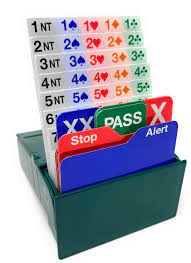“When the Bridge community moved online in 2020 due to Covid, players began to cheat.” --Isaiah Kahn, 6th grade
Duplicate Bridge is a card game played by four people. It works like this: You get a hand of 13 cards, and bid on how many tricks you and your partner think you can take, along with which suit will be wild. Bids can also be a signal to your partner (your partner is the person across the table from you) that describes your hand. The highest bidder must make that amount of tricks.
Bridge is the type of game where it seems like cheating would take the fun out of it. While it’s competitive, it’s also somewhat of a “hey, look, I played that hand well” type of game. There isn’t that much money or fame to be found in bridge tournaments, although it can generate more money than chess. While there aren’t cash prizes in most bridge tournaments, there are some people who will pay up to 200,000 dollars for a top Bridge player to be their partner.
Bridge also doesn’t bring about too much fame. While we are admittedly in middle school- and the average bridge player is 71 years old- just 7 out of the 16 people I surveyed have even heard of Bridge, and only 3 actually know what it is.
Multiple elite players such as Michal Nowosadzki, Sylvia Shi, Cédric Lorenzini, and Curtis Cheek confessed to cheating during the pandemic. The ways they cheated were very simple. For example, people would text their partner their hands, or log into the game on a spectator account, allowing them to see everyone’s hands.
“I feel really bad for what I did,” says Michal Nowosadzki, confessing and apologizing for cheating. “It was not only very bad but also extremely stupid.”
Sylvia Shi also confessed to cheating. “I did it because it was so, so easy, and so tempting,” she says. “I rationalized, ‘I’m not a cheater, this isn’t something I would do in ‘real’ bridge. I’ll just see the cards sometimes, it will all be over when we get back to face to face bridge in a few months.’ It sounds so stupid when I say it now.”
Sylvia Shi has been suspended for 3 years by the American Contract Bridge League (ACBL). She will also be on probation for an additional 3 years after the suspension ends.
Bridge is the type of game where it seems like cheating would take the fun out of it. While it’s competitive, it’s also somewhat of a “hey, look, I played that hand well” type of game. There isn’t that much money or fame to be found in bridge tournaments, although it can generate more money than chess. While there aren’t cash prizes in most bridge tournaments, there are some people who will pay up to 200,000 dollars for a top Bridge player to be their partner.
Bridge also doesn’t bring about too much fame. While we are admittedly in middle school- and the average bridge player is 71 years old- just 7 out of the 16 people I surveyed have even heard of Bridge, and only 3 actually know what it is.
Multiple elite players such as Michal Nowosadzki, Sylvia Shi, Cédric Lorenzini, and Curtis Cheek confessed to cheating during the pandemic. The ways they cheated were very simple. For example, people would text their partner their hands, or log into the game on a spectator account, allowing them to see everyone’s hands.
“I feel really bad for what I did,” says Michal Nowosadzki, confessing and apologizing for cheating. “It was not only very bad but also extremely stupid.”
Sylvia Shi also confessed to cheating. “I did it because it was so, so easy, and so tempting,” she says. “I rationalized, ‘I’m not a cheater, this isn’t something I would do in ‘real’ bridge. I’ll just see the cards sometimes, it will all be over when we get back to face to face bridge in a few months.’ It sounds so stupid when I say it now.”
Sylvia Shi has been suspended for 3 years by the American Contract Bridge League (ACBL). She will also be on probation for an additional 3 years after the suspension ends.


